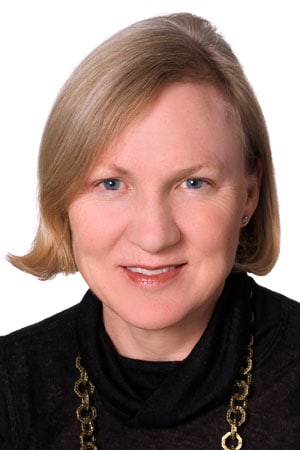PROPRIETARY TRADING
By Michael Shari
Corporate clients of investment banks around the world could see a dramatic impact from the Volcker Rule, Basel III and other new rules against bank proprietary trading.
Like his counterparts at many large and small corporations that do business across international borders, Neil Garrod, the group treasury director of Vodafone in London, is taking a hard look at the potential impact of a major development in the global banking industry that is making headlines. Driven by new regulations emanating from the United States and Europe, banks everywhere are receding from the business of proprietary trading, in which banks used to buy and sell securities for their own profit and at their own risk. The banks are closing down so-called prop desks and laying off traderswho, in an ironic repetition of history, are showing up at hedge funds that used to manage these investments for banks until the 1990s.

Vodafone, a capital-intensive European mobile-phone giant, has reason to be watchful of such market-changing developments because it frequently raises money on the capital markets in both the United States and Europe. Vodafone raised $6 billion in a five-part bond offering in the United States in February 2013, and now its looking to refinance a revolving credit facility in the not too distant future, according to Garrod. As banks recede from proprietary trading, the concern is that fewer buyers and sellers will make the secondary market less liquid, which could ultimately make it harder for the company to dictate pricing for its debt.
The lack of proprietary trading merely surfaces in the form of secondary market liquidity being almost zero now, says Garrod. In theory, it should mean that investors demand more of an issue premium. In other words, publicly listed companies that issue new shares or bonds anywhere can be expected to come under pressure to sell them for higher than their market value, which can be a costly exercise for the company issuing the securities.
DRYING UP
Legal experts who are advising banks that operate outside the United States on the impact of their exit from proprietary trading are hearing from their clients a grave concern that liquidity could dry up in the absence of proprietary traders. As to secondary markets, it seems to be widely accepted that there would be less liquidity than before, says Robin Maxwell, an attorney at Linklaters in New York whose clients are banks that operate outside the United States. She explains: The more ready buyers and sellers there are, the more liquid the markets are, just as a mathematical consequence.

|
|
|
This potentially sweeping change will be largely the result of a wave of new rules that regulators on both sides of the Atlantic intended to help banks recover from the global financial crisis of 2008. The Volcker Rule, the final piece of the DoddFrank Wall Street Reform and Consumer Protection Act, takes effect in the United States on April 1 and will be followed by a compliance period ending July 21, 2015.
With few exceptionsnotably for market-making and prime brokeragethe rule forbids banks from investing in stocks or bonds on their own account. Some European banks are complying with the American rule because some of their largest corporate clients are in the United States.
Then there is the impact of the Basel III banking rules, which will be taking effect in phases through 2019. These rules require banks to allocate substantially more capital against the value-at-risk (VaR) in their investments, which multiplies their cost of owning stocks and bonds. And recent regulations announced in Germany and France require banks operating in those countries to ring-fence their proprietary trading operations separately from their main banking operations.
Yet another driver is EMIR (European Market Infrastructure Regulation), a set of rules on derivatives in the European Union that are moving transactions from the banks prop desks to independent exchanges at lower cost and less counterparty risk. But the decline of bank proprietary trading is also a function of banks shrinking their balance sheets in the wake of the eurozone debt crisis of 2010.
The other regulations are moving in similar time to the Volcker Rule, says Bridget Gandy, managing director at Fitch Ratings in London. With or without the Volcker Rule, there has been a general clampdown anyway on prop trading on banks.
IMPACT ON EMERGING MARKETS
Banks in Asia foresee little impact as their counterparts in the United States and Europe exit from proprietary trading. As a result, their corporate clients say they dont expect any change, either. Banks here tend to derive more of their income from interest on loans and deposits than the fee-based business of investment banking, so there simply isnt that much proprietary trading to be abandoned, explains Ritesh Maheshwari, managing director at Standard & Poors in Singapore.
We havent really seen the impact of the new regulations on our ability to raise funding, says Iwan Hadiantoro, chief of group treasury and investor relations at Astra International, an Indonesian conglomerate with interests that range from car manufacturing to mining. Astra regularly raises funds through rights issues on the Jakarta Stock Exchange. I believe investors will continue to pick businesses with strong fundamentals and good growth in determining their investment in non-US corporates.

|
|
|
However, the story is different in other emerging markets. In Africa, for example, the impact on corporates of banks receding from proprietary trading could be profound as they focus more on underwriting new issues, according to Helmut Engelbrecht, head of investment banking for Africa at Standard Bank Investment Bank in Johannesburg. He notes that Nigeria has already enacted its own version of the Volcker Rule, and South Africa is aggressively implementing Basel III.
Clients will have to manage their businesses in such a way that they are capital-markets-friendly. They must be geared for increased disclosure, obtaining ratings, etc, says Engelbrecht.
The South African banker cites two driving forces. In theory, capital market issuance should increase, he says. Yet at the same time, he predicts that the impact on corporates will be an increase in funding cost for longer-term debt, an increase in cost for standby liquidity lines, a diversification of funding base and a move away from banks to capital markets.
But it will take a while before the impact of global regulatory changes on banksand the corporations that depend on them to raise capitalwill be tangible. For the short-to-medium term, the impact is likely to be minimal because another, more powerful force is artificially creating the liquidity that corporations are afraid will dry up. Under their quantitative easing, or QE, programs, the US Federal Reserve, the Bank of England and other central banks have been buying hundreds of billions of dollars every month, which has had the effect of keeping interest rates low and bond prices high.
QE is really mitigating any impact that proprietary desks pulling back from the banks might have, says Garrod. There is no sign that we as corporates are paying more for our money because of a pulling back of proprietary position-taking in the investment banks, because its completely offset by QE liquidity injections.
In the meantime, companies that depend on investment banks to help them raise capital by issuing stock or issuing bonds, or to advise them on mergers and acquisitions, are likely to find that their bankers will be more eager than ever to work with them.
WANTED: NEW REVENUE STREAMS
The reason is that as the banks recede from proprietary trading, they are being deprived of a major revenue stream that, according to some analysts, hasat times, for some global banksbeen comparable in value to that of investment banking. In an effort to replace some of that lost revenue, the banks can be expected to focus on other businesses, such as underwriting, which Gandy expects to become a more competitive business for investment banks.

|
|
|
Their reputation is all they have in this business. They are going to have to show that they do that as well or better than any of their competitors, says Gandy.
Thats why some chief financial officers say they expect to see a marked improvement in the level of service they receive from their investment bankers.
Arzu Akelik, CFO of MediaSa, a conglomerate in Istanbul with diverse interests ranging from television broadcasting to shipping, recalls that managers of several public and private Turkish banks told her at a meeting in Istanbul on January 6 that they are ready and compatible with Basel III criteria because they had long since sworn off proprietary trading in the wake of Turkeys financial crisis in 2001. That crisis was blamed partly on domestic banks that had taken short positions in Turkish securities for their own profit, she explains.
I believe in the near future banks will provide more capital access and will be able to implement more aggressive growth plans, says Akelik. I believe they will raise more money, they will give more importance, they will deal with their clients more closely than before.
Of course, not every international corporation is convinced that the elimination of proprietary trading will affect the trading or pricing of their shares or bonds. We do not expect any changes for Volkswagen, says Christine Ritz, group head of investor relations at Volkswagen in Wolfsburg, Germany. Adds a treasury official at another publicly listed European manufacturer who asked not to be identified: We think the impact is marginal for us.
DIFFICULT ACCESS?
Nevertheless, any public company would be well advised to scrutinize this regulatory tsunami and prepare for a challenge in accessing capital markets. Now that the Fed has indicated it will gradually end its bond-buying program this year, effectively unwinding QE, liquidity can be expected to start drying up over the next several months. That development is expected to drive down bond prices, as will a continuation of interest rate increases for 10-year Treasuries that began last summer. These developments could easily set the scene for the scenario that Vodafones Garrod and Maxwell at Linklaters envision before year-end.
What impact the reduction in secondary liquidity will have on the market has not been tested as of yet. When it is tested, I think it could be quite dramatic, says Garrod.
In Europe the tightening of so-called liquidity ratios under Basel III, which still allows banks to hold bonds on their own account, is already forcing banks to favor highly rated government bonds over corporate ones. Nothing else is thought of as being particularly liquid, which means there is a false motive to hold government debt at a bank rather than hold equities, says Gandy. An unforeseen consequence of all of this is that liquidity comes out of the market. In the months ahead, the most predictable result would be a dampening of demandand thus fewer shares trading hands, likely at lower pricesfor the outstanding shares of non-US companies.
VOLCKER RULE REACHES FAR BEYOND US BORDERS
The language of Section 619 of the Dodd-Frank Wall Street Reform and Consumer Protection Act, known as the Volcker Rule, which was finalized on December 10, 2013, by five US federal agencies including the Fed and the SEC, redefines proprietary trading. The redefinition allows exceptions that are strategically important for non-US banks that have a US branch or subsidiaryor simply do business in the country.
Now a bank outside the United States can still trade in US securities on its own account as long as the beneficiary of the investment is not a US person or a US legal entity of the bank. The rule also allows investment banks of any nationality to hold a stock or a bond that it happens to be underwriting for a clientfor the purposes of stabilizing an IPO, for example. And any bank that has a market-making business will be allowed to hold securities for that purpose as well.
Regulators want this to be substantial change. But they do not want to shock the market with this, explains Matthew Stroud, head of strategy and portfolio construction at Towers Watson Investment Services in New York.
Yet despite these concessions for non-US banks, explains Robin Maxwell, an attorney at Linklaters in New York, the main challenge they will face in complying with the Volcker Rule is that it sweeps them into a US-centric compliance and reporting regime that will inevitably conflict with home country customs and requirements.



